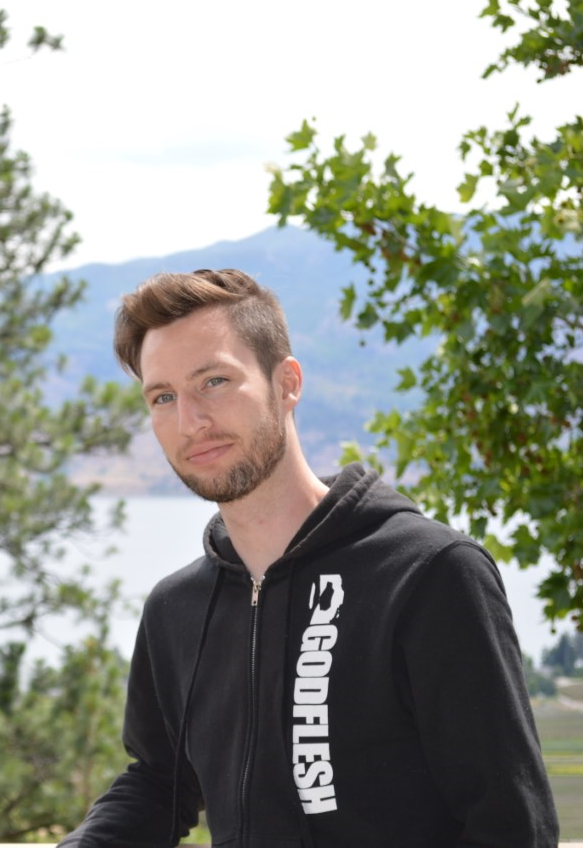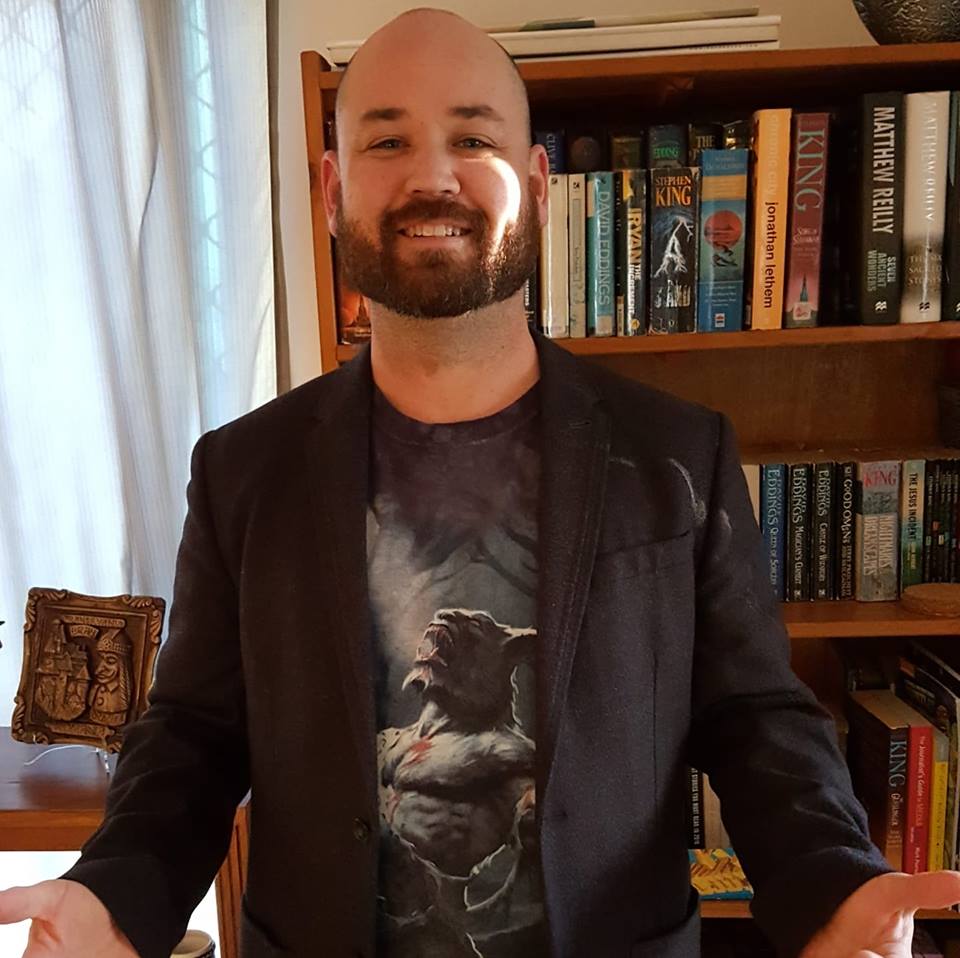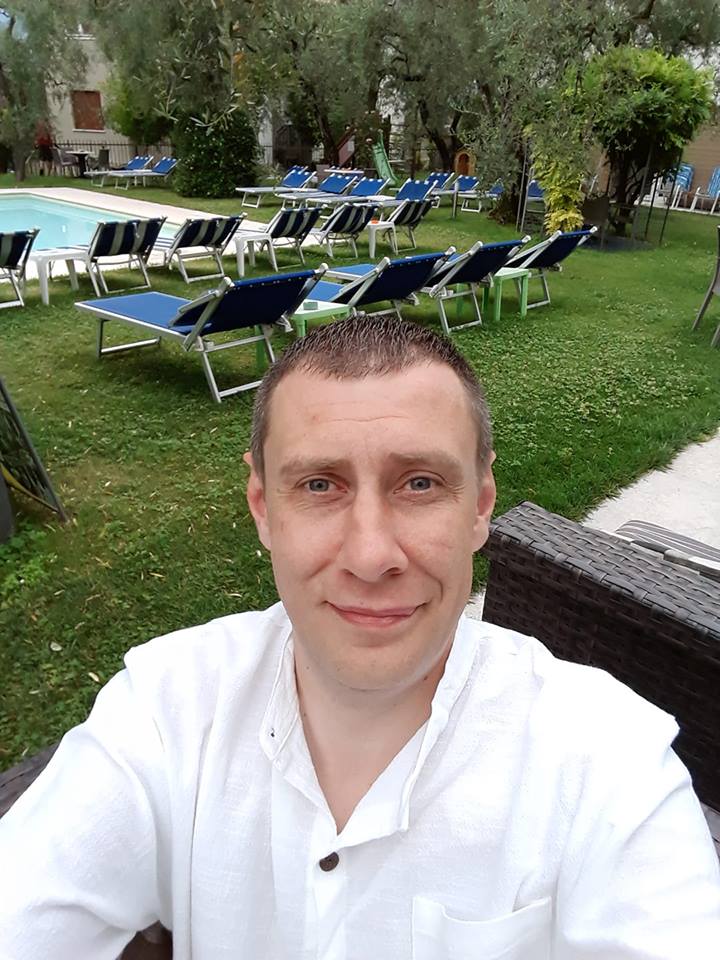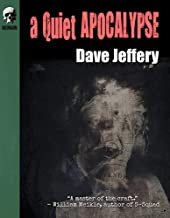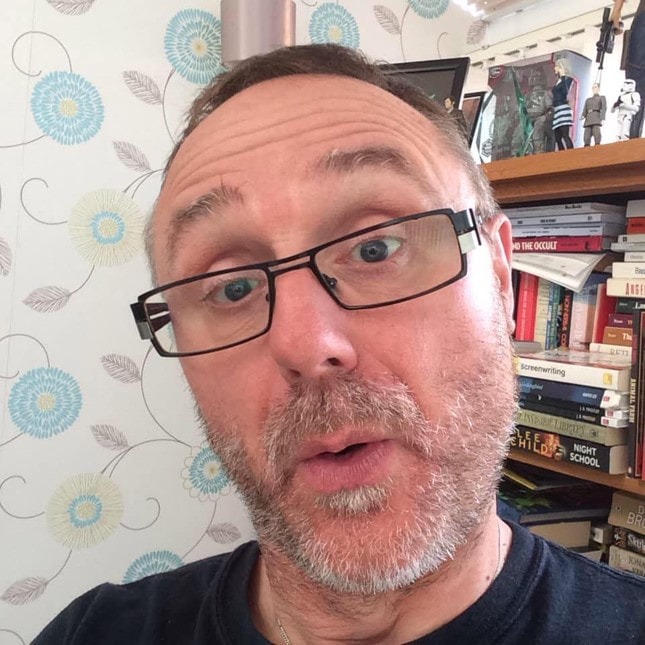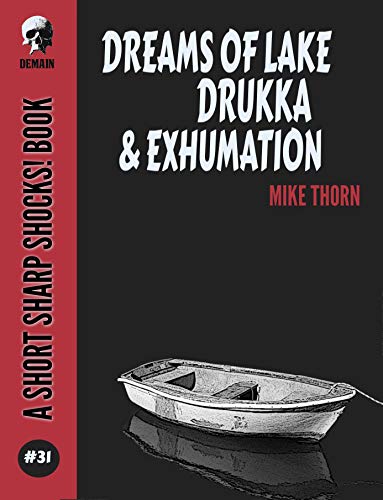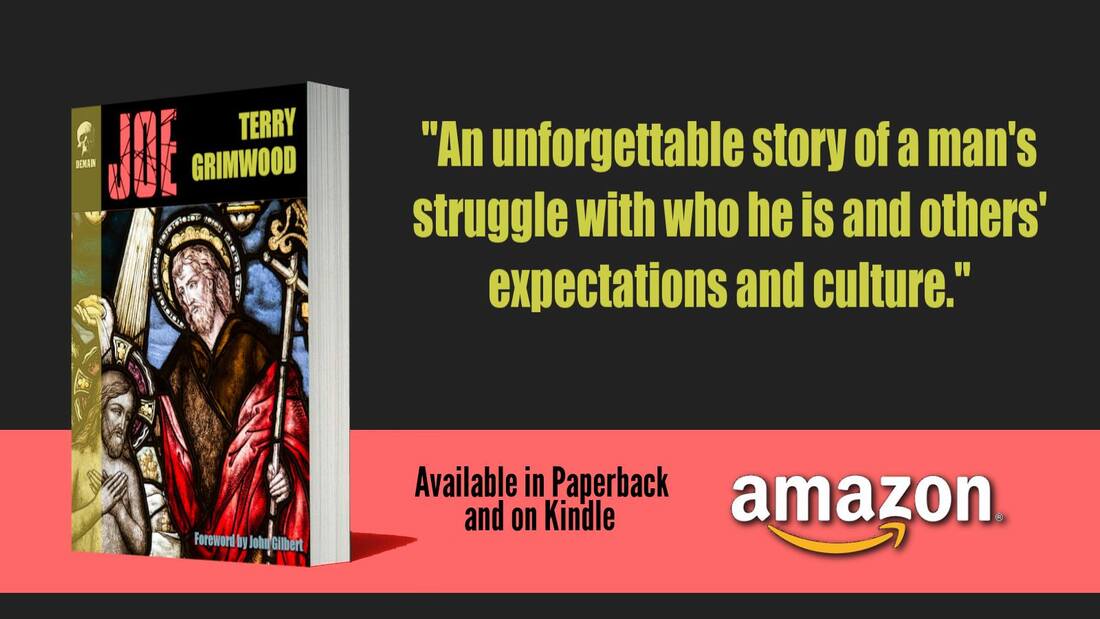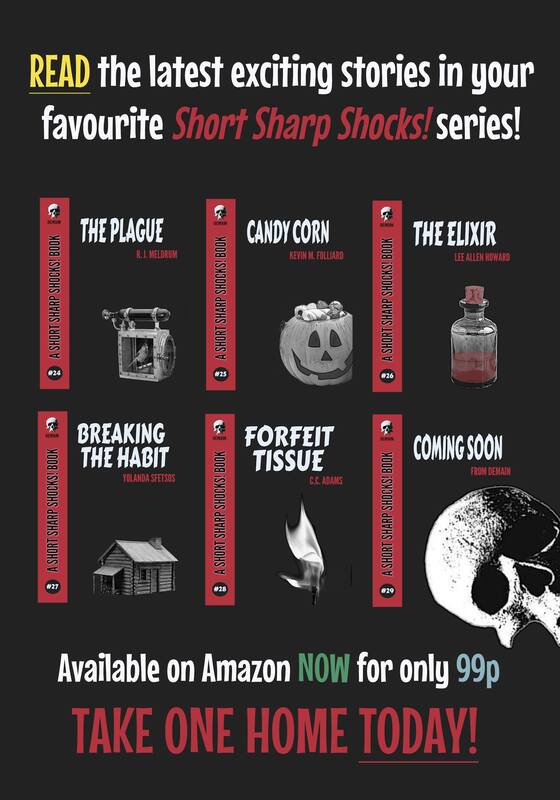|
|
|
Our next interview is with Russell Smeaton, author of the brilliant Apples & Snail Trails, Book 32 in the Short Sharp Shocks! series. Recently Dean and Russell sat down to chat.
DEMAIN PUBLISHING: Hello Russell. For your new readers, can you tell us a little about yourself and how you became a writer. RUSSELL SMEATON: Hi. So as you’ve probably guess my name is Russell Smeaton. I’m a 40-something (ahem) writer, living in the North East of England. I’ve spent a bit of time travelling around, but seem to have found my perfect place up by the North Sea. Why did I become a writer? That’s a great question, and I probably don’t really have a good answer. I don’t really consider myself to be a writer. I’m more someone who has loads of ideas floating around my head that occasionally make their way to paper. DP: Ah, well good for you. I would say that you are definitely a writer and we truly loved both of your stories...can you tell us something about your stories. RS: I dabble with a few different ideas, but I’ll try and sneak in a cat into quite a few. DP: I love writers that do things like that. In some of my own stories I drop little ‘secrets’ in and have actually started linking a lot of work together. I’m not sure whether anybody notices (or even cares!) but it gives me a smile. A good friend of mine created this character called Candide who I absolutely loved so now and again Candide does get a mention...can you say something about your protagonists? RS: In Apples, the main characters are father and daughter. I lent heavily on my own experience of being a dad – my daughter is often telling me what to do, and I generally do it. She’s usually right. DP: Did you have to do much research this time around? RS: I’m very lazy so generally try to write about stuff I know. I’ll do a little bit of research from time to time to fact check stuff, just to ensure a bit of credibility. I’m in the process of drafting out my first attempt at a novel (stop the press!) so I’ve had to go to the library a few times to read up on English history. Luckily for me they have a comprehensive kids section which is about the level of my historical research. DP: English history? Cool – sounds very much up my street. Make sure you think of DEMAIN when it comes to publication...for your Short Sharp Shocks! were there any scenes which you found difficult to write? RS: Action scenes are something I’ve been experimenting with. Writing weird fiction often involves, well, weird stuff and not necessarily action stuff. I think to actively get across a sense of excitement through words is no easy feat. Also, genuine fear. So far, I’ve only read one short story (by a wonderful writer called Michael Wehunt) that has actually scared me – and if I can ever achieve that feeling of fear, then I can happily bottle it up and sell it! DP: Oh that would be really cool to check out...creatively Russell what would you say is your biggest success? RS: That’s a good question. Way back in 1997 the band I was playing had a record contract and we released an album so that was pretty exciting. As I was the drummer, I can’t really take too much credit for that. So, I’ll go with my first Kickstarter. It was quite modest, a series of postcards featuring some pictures I created. It was a bit of a gamble as I only had a small amount of people interested, so I was over the moon when it reaches its goal. It didn’t make any money, but for me it was a big deal. I also kickstarted my first book collection, which was exciting. I stupidly funnelled all the profits into the book so came out with no profit. But the book looked lovely, with black inlays – something I’m very proud to have completed. DP: A man with many talents. Never give up is my motto whatever your creative field is, the hard work will pay off in the end. So what books (or authors!) do you read and do they have an influence? RS: I try and read all sorts, graphic novels as well as books. It’s hard to say the direct influence I get, but I’m without a doubt swayed by certain things, certain moods that other writers achieve. Writing is a continual learning process for me, so I’m always discovering something new. If you’re looking for names of things, then I’ll have to go with the classics like Lovecraft or Clark Ashton Smith, and then move forward in time to Kurt Vonnegut and Jack Kerouac. Another author I keep coming back to is Martin Millar, who wrote The Good Fairies of New York. I absolutely love that book, and I think that might be the one biggest influence on what I try and achieve. DP: Another book for me to check out. I love doing these interviews because I’m learning so much...with that in mind, what is ‘horror’ to you? RS: This depends on my mood. Some days horror is a big monster hiding under the bed, some days it’s the uncertainty of daily existence, other days it’s the loss of loved ones, or the crushing realisation that everything is just a bit pointless. I could go on. Ask me on a specific day and I’ll tell you something different. DP: Sometimes I wonder myself if it is all pointless...anyway anyway...is there a genre book or film you’re looking forward to reading / seeing? RS: I’m woefully out of date with modern developments. I’ve been recently re-reading older books and thoroughly enjoying them. I’m friends with quite a lot of writers via Facebook, most of whom have things in the pipeline, and that’s always something to look forward to as well. I’m still waiting for a decent Lovecraft movie, and whilst there’s lots of talk of the Nicholas Cage movie, I’m not sure I’m looking forward to it! We’ll see. DP: You mean the one directed by Richard Stanley? (it’s brilliant – I saw an early cut – hopefully you’ll love it too). Is there anything that Russell Smeaton is afraid of? RS: I’m afraid of plucking my bellybutton too hard and somehow becoming unravelled. I’m not sure if that’s ever worked its way into my stories. Not yet anyway! DP: Haha what a great idea – please write that. I’m laughing to myself wondering whether there is actually a sub-genre of ‘belly button horror’. I was going to google it but then stopped. Just in case. Ha ha. Creatively is there something you haven’t yet achieved? RS: I’m in the process of creating a game with some friends. Whether it will amount to anything we shall see, but it’s an exciting thing to see morph and develop. DP: Good luck with that. Okay, couple of fun questions. Marvel or DC? RS: Zap comics for me! DP: Nice. And finally then, can you tell us something surprising about you? RS: I dunno – I don’t think I have any secrets anymore! Social media is great, but it’s all out there, eh? I have a few tattoos, that usually surprises people? Thank you Russell for your time. The best of luck with your Short Sharp Shocks! which is out on the 27th September. If you would like to connect directly with Russell: Website: https://facebook.com/tikirussy Twitter: twitter.com/tikirussy
0 Comments
Author Interview: Mike Thorn - Short Sharp Shocks! (31) Dreams Of Lake Drukka & Exhumation9/25/2019 Mike Thorn is new to the Demain family. 27th September sees the release of his Short Sharp Shocks! Dreams Of Lake Drukka & Exhumation. Just before publication Mike and Dean sat down to chat.
DEMAIN PUBLISHING: Hello Mike, great to meet you. Can you tell us a little about yourself and how (or why) you became a writer? MIKE THORN: I’ve loved reading and writing for as long as I can remember. For whatever reason, my imagination has always leaned into the dark and weird. I’ve loved genre for as long as I’ve loved books—I started reading J. R. R. Tolkien, C. S. Lewis and R. L. Stine at a young age, and then picked up Stephen King around twelve or thirteen, and I haven’t looked back since. Hubert Selby Jr. was also a major discovery… I started reading his work in my teens. DP: Hubert Selby Jr.! There’s a name I haven’t heard in a little while. Great author and I’ve always had a soft spot for Last Exit To Brooklyn – so thanks for reminding me...what are your two stories Dreams of Lake Drukka & Exhumation about? MT: It was only in retrospect that I could see the connections between these two stories. When I revisited them for this publication, it struck me that they work well as companion pieces. Both plots depict unfulfilled pacts with supernatural undercurrents, both include journeys to uncover unresolved familial trauma, and both pivot around the revelation of repressed memories. I wanted to explore the relationship between setting and atmosphere in these pieces, and to depict horror within internal and physical 'sites of trauma.' DP: And your protagonists? MT: Like many of my protagonists, these characters are grappling with painful memories / experiences that have held them back, consciously or unconsciously. One story focuses on a character who is the agent of her own revelations, whereas the other story sees someone whose agency is quickly and brutally taken away. DP: Let’s talk about research, did you have to do much this time around? MT: I’m not typically a research-intensive fiction writer. In my critical work, I tend to engage in a lot of research, but I write stories from a very unconscious and personal place. I almost always graft settings onto places I’ve seen, so that I’m able to spatially orient myself and the reader. DP: What books / authors do you read and do they influence you? MT: As a writer, I think reading is absolutely crucial: I soak up a bit of something from every book, article or story I read, whether I like it or not. I try hard to have a ‘balanced’ reading diet. Of course I love genre fiction, but I make an effort to read across genres. I’m currently reading George Eliot’s Middlemarch and Alexandra West’s The 1990s Teen Horror Cycle: Final Girls and a New Hollywood Formula. Some favorite contemporary writers, off the top of my head: Kathe Koja, Stephen King, Niall Howell, S. P. Miskowski, Joshua Whitehead, Robert Dunbar, Gwendolyn Kiste, Eden Robinson, Calvin Demmer, John Claude Smith, Farah Rose Smith and Daniel Braum. I recently read Erin Vance’s debut novel, Advice for Taxidermists and Amateur Beekeepers, which is terrific. DP: I’ve seen Kiste’s name a few times recently, I’ll have to check her out. Are there any genre books or films you’re looking forward to? MT: I’m excited to see Mike Flanagan’s adaptation of Doctor Sleep. It’s a very weird novel, and I’ll be interested to see how it translates to the screen. Rob Zombie is probably my favorite living horror filmmaker, so I’m anxious to see his latest, Three from Hell. DP: Well, there you go, I didn’t know that about you – I love Rob as well (music and film)! As I’ve said quite a few times before, the uncut version I saw in Cannes of House Of 1000 Corpses was A+ film-making. A real piece of art – sadly the version which was released in cinemas was a pale imitation (but still good in it’s own way) and we talk just a few days since Sid Haig’s passing. RIP Sid. Okay, so what is Mike Thorn scared of? MT: I’m terrified of climate change and ecological catastrophe. I’m afraid of human capacities for cruelty and greed. I’m afraid of institutions and people with too much power. I tend to write a lot about power and cruelty. It’s probably a cathartic exercise on some level. DP: And finally, creatively is there anything you haven’t done yet? MT: Right now, I’d just like to make it to the finish-line with my current novel-in-progress. Thank you for your time Mike. Good luck with your Short Sharp Shocks! If you would like to connect with Mike direct: Website: mikethornwrites.com Twitter: @MikeThornWrites Facebook: https://www.facebook.com/profile.php?id=100015685119662 Goodreads: https://www.goodreads.com/author/show/5829518.Mike_Thorn Zachary Ashford’s Short Sharp Shocks! The Encampment By The Gorge / Blood Memory is being published on the 27th September. Dean and Zach sat down recently to talk about it.
DEMAIN PUBLISHING: Great to speak to you Zach, welcome to the Demain family. First up then, tell us a little about yourself and how (and maybe even why) you became a writer. ZACHARY ASHFORD: Like most people, I think it starts with a simple love of stories. Having parents that read to me every night until I was able to take the mantle from them and read them myself is probably the first thing responsible, but the actual act of writing, I think, is owed to teachers. As I grew up, I used to tell my folks I wanted to be an author, and Mum had a good response to that. She would usually say, ‘Well, all the good ones were journalists first, so you need to take that pathway.’ So, I went to university to become a journalist. After that, I was offered a job with a radio station and I then spent several years in radio. At Christmas-time, I would write these comedic Christmas-themed radio plays, but I’d always make them horror-themed: Satan masquerading as Santa in an attempt to come to earth, Christmas zombies in the shopping centre, that sort of thing. The whole time, I had stories floating in the back of my mind. It wasn’t until I’d gone back to university, become an English teacher and matured that I developed the discipline required to sit and write consistently. In the last year or so, since I had my first story published by Dark Moon Digest, which was a fantastic moment – Max and Lori are great people and I still geek out over their stuff – I’ve been able to write pretty regularly. I’ve had a few stories accepted now, and the next step is that novella and then a novel. As for why, it’s just because of a love of story. Particularly, gruesome monsters and action-based violence; I love that stuff. I love coming up with ideas and feeling as if I can use them as metaphor or message. There’s nothing as rewarding as looking at something you’ve created and going, ‘Yeah, that’s good.’ DP: You are so right about that...can you tell our readers something about your stories? ZA: With Encampment by the Gorge, I let a linear thematic story grow into something I’m confident saying is visceral and intense when I focussed on telling a relentless cosmic horror. And with Blood Memory, I wanted to build some ‘monster as metaphor’ commentary on some pretty disgraceful Government policy decisions at the time. DP: So did you have to do much in the way of research? ZA: I’m a bit of a pantser when it comes to research. I’ll usually get to a key point that requires more info and then start Googling or making phone calls. I’m pretty sure the local cop-shop has me on a watch list for calling up and asking questions like, ‘Hey, who collects the dead bodies of from car accidents?’ or ‘What model is the gun you use?’ Typically, though, I just bullshit my way through something and if it feels right, I’m happy to rely on the suspension of disbelief. DP: That’s really cool that you have a link to the police and they can help you with your writing. I was watching a David Lynch documentary last night and he said much the same as well as contacts in the morgue who would let him come in and see the dead bodies...explains a lot ha ha! Lynch has always been an influence on us here at Demain – what authors / books have made a mark on you? ZA: I think like most people doing what we do, Stephen king is the obvious one. There are just so many great stories that it’s almost impossible not to be influenced by some of his work. Other than that, there is such a massive range of excellent authors working today, that anyone trying to improve their craft has to look at some of the work from an analytical perspective and break down the parts of the craft they can apply to their own writing. My favourite ever book is probably Lord of the Flies, but in terms of authors that I read regularly, I try to mix the classics in with the more modern stuff. My shelves are a mix of Steinbeck, Hemingway, McCarthy, King, Palahniuk, Richard Flanagan, Shakespeare, Mieville, Neal Stephenson. In terms of horror, The Fisherman by John Langan blew me away, Paul Tremblay, Stephen Graham Jones, Max Booth III – and then there’s the Kindle…I could do this all day. Adam Cesare is fantastic. I really love his stuff. Chad Lutzke will break you. I wish I could write like Margaret Atwood. Too many dudes in here, by the way…Broken Monsters by Lauren Beukes was easily one of the best books I’ve read in years. DP: Wow – that’s an eclectic mix and fair play to you. When I was first thinking about becoming a genre writer I spent my whole time reading horror books, nothing but horror because I thought that was the way to go. As I got slightly older though I realised that I needed to read all types of books to become the best writer I could be. You’ve noted some great writers / titles there – I need to check them out. Thank you. What then would you say is ‘horror.’ ZA: I have this discussion with students all the time. They’ll tell me something isn’t horror because ‘it’s not scary,’ and I always tell them that horror isn’t about the immediate scare (although that is a lot of fun,) it’s the thought it leaves you with. An uncomfortable theme, a disturbing truth, a realisation that, ‘yeah, things are broken and they’ll never get better, the idea that people die.’ I think if you compare Hereditary to the most recent Annabelle, you can really see that. Hereditary had me constantly fidgeting in my seat while that Annabelle movie – which was full of jump scares – was more like a Goosebumps book. By now, we know that in that world, people don’t get hurt. They share birthday cake at the end. In Hereditary, you can’t help but feel you’re watching a house burn down and you just can’t look away. DP: We are so on the same page about this! What genre book / film are you looking forward to? ZA: If you’d asked me two days ago, I’d have said It: Chapter Two, but that’s not applicable now. I did leave the cinema with a big smile on my face, though. I’m looking forward to seeing what can be done with the television series of the Dark Tower. I’m pretty excited to see what can be done with Y: The Last Man. Definitely the adaptation of The Troop by Nick Cutter. I loved that book. As for books, I can’t name any that are coming out off the top of my head, but I’m looking forward to seeing what Unnerving Mag’s Rewind or Die series looks like. Also, Max Booth III’s upcoming release through Cemetery Dance. DP: Nice. My favourite King film (and novel) is The Dark Half – Timothy Hutton is brilliant in that. In real life what scares you? ZA: Sharks, man. It’s probably more of a healthy respect, but I’m really glad I have a swimming pool. I read a lot about sharks in the local waters as part of my journalism degree, and there are just so many. I love that they’re in the water, and I hate things like the shark cull, but man, if I think things look even a little bit ‘sharky’ you can count me out. DP: Ha ha – I know what you mean, I won’t go in the water if it is too deep and though I want to buy a boat at some point in the future, I must make sure it is big enough! Creatively is there something you haven’t managed to achieve yet? ZA: Crossing that border into ‘novelist’ territory. That’s always been the ultimate goal. I’ve a couple of manuscripts. One, which I’m editing to make it a bit less clichéd and ‘tropey’. The other is non-horror and I should probably pay it more love in terms of trying to find a home for it. It’s kind of fallen by the wayside since I’ve been focussing on the horror stuff. DP: Okay, a fun one: Marvel or DC? ZA: I’m a Marvel fan-boy at heart. I’ve still got most of the first run of Deadpool (not the limited series), and a few others like the complete run of Nightstalkers, but if I put my adult head on, that Vertigo line was pure gold. The Invisibles is probably my all-time favourite. So, Marvel with a caveat that says the real prize-winner is DC’s Vertigo line. DP: Wow you know your stuff. It’s probably a good job I didn’t ask which actor you thought played Spiderman the best (for me, Tom Holland hands down) but we’ll keep that question for another time. Final question then – can you tell us something surprising about you? ZA: For several of my formative years at the end of high school, I spent my weekends volunteering at Australia Zoo, the home of the Irwins. The kids were just babies and I remember seeing Bindi taking tentative steps while carrying a small python. I was just a kid myself, and Terri knew me as the guy with the zebra-patterned Reebok shoes, which she commented on every time. Steve was exactly as he was on television. His personality wasn’t a persona, he was that nice. The first time I met him on a personal level, he came into the bathroom while I was at the urinal. He didn’t wait to shake my hand. He reached across the trough and introduced himself there and then. If that doesn’t sum him up as a person, I don’t know what does. Now that is a cool story to end with! Thank you Zachary for your time. We wish you all the best with your Short Sharp Shocks! If you would like to connect with Zach direct: Website: www.zacharyashford.com Twitter: https://twitter.com/ashford_zachary September 27th sees the publication of Trevor Kennedy’s Short Sharp Shocks! Crown Of Thorns. Dean and Trevor have known each other a few years now and have worked together on several projects. Trevor is a super busy man with his writing, his publishing, his radio show and his acting! A man of many talents. Trevor spared some time in his busy schedule recently to talk about his upcoming release:
DEMAIN PUBLISHING: Hey Trevor, thanks for talking with us today. Time is precious, so let’s get down to it. Can you tell us a little about yourself and how (and why) you became a writer? TREVOR KENNEDY: Hi there. My name’s Trevor Kennedy, a 42-year-old independent writer / editor / publisher from Belfast, Northern Ireland. I’ve always been quite a big reader and used to write horror stories when I was a kid. As I got older and into my late teens and twenties, let’s just say life got in the way and I pretty much abandoned my creative interests, although I always still read and watched horror / sci-fi / fantasy films and TV shows. In my early-to-mid-thirties I began dabbling again with writing and other things such as acting and it has all just really progressed from there. I’m finally now doing the sort of work I really enjoy and have a huge passion for. DP: Fair play to you Trevor, from a personal point of view I think you’re really knocking it out of the park with your Gruesome Grotesques anthologies as well as your magazine Phantasmagoria – so well done on that. With regards to Crown Of Thorns, what is it about? TK: It is based, in part, on the real life witchcraft trials in Islandmagee, here in Northern Ireland in the early eighteenth century. My story is set in the late 1980s, however, and also concerns a demonic entity, toads and an ice-cream van. DP: I love the ice-cream van (and thanks to Adrian Baldwin for his cover!). So who are your protagonists? TK: Tommy and Jim are two thirteen-year-old lads. They’re at an age where they’re experimenting in things like underage drinking, smoking and the viewing of certain sleazy publications. They swear a lot, all in the name of bravado and trying to appear like ‘big lads’. In short, they’re assholes, but likeable ones at that (I hope), and vulnerable too. They’re based, partly, on myself and my friends when we that age and typical of a lot of teenage boys. DP: We’re definitely on the same page when it comes to likeable (and often loveable) assholes. I did enjoy reading about Tommy and Jim and reminded me a little of my youth (spent of misspent I’m not entirely sure). When you wrote Crown Of Thorns, did you have to do much research? TK: I researched the Islandmagee witchcraft trials after discussing it with a very knowledgeable friend of mine, Sally Cochran, who knows her local history very well and is a bit like a wise old Jedi Master to me, a female Obi-Wan Kenobi of sorts, haha. The character of Mr Needlesticks is an idea I had a couple of years or so ago, wrote down, but never used, until now. Other aspects of the story include little bits of my own life mixed with the fictional. DP: I won’t say too much right now but I hope we see more of Mr Needlesticks in the future! Were any of the scenes hard to write? TK: I find writing in general very daunting. I’m intimidated by the very thought of it. I’m not very confident in my work, but I’m getting there. I would never, ever want to write anything which I would consider to be average or below par, so I always give it my 100% very best effort. It’s the only ‘job’ I have ever taken seriously in my entire life. It is very hard work too, of course, but there is such a buzz to be felt when looking back over a completed work. DP: Totally agree, totally agree. So creatively (thus far anyway!) what would you say was your biggest success? TK: Writing / publishing / editing-wise it would without doubt have to be Phantasmagoria Magazine, which continues to grow in ways that have surprised even myself. On the acting side of things, I have also appeared in several stage plays, including the professional productions, 1932: The People of Gallagher Street and Letters From the Front. My radio show for www.bighitsradio.uk, Sunday Service, a comedy / chat / music show, also continues to evolve and I always really enjoy doing it. DP: As I said in my intro, a man of many talents. Keep up the good work but don’t overdo it! Who would you say influenced you as a writer... TK: I grew up reading the likes of Stephen King, Roald Dahl, Fighting Fantasy gamebooks and all sorts of other weird fiction, so they will always hold a special place in my heart. I’ve always been a big fan of many of the classics too, from literary giants such as Lovecraft, Poe, Stoker, Orwell, M. R. James, Borges and Mark Twain. I love the gritty realism of Irvine Welsh’s stuff and the existentialist heaviness of William Peter Blatty’s work. Thomas Harris’s Hannibal Lecter novels too. There’s loads more, of course, especially within the British Fantasy Society circles and the indie scene (Russell Holbrook, Dean M. Drinkel [thank you!] etc). As a kid, I would have read lots of UK-based genre publications like FEAR and the BFS material and they inspired me in great ways, so for me now to be working alongside some of the writers and artists whom I have always held in the highest regard is the greatest of honours. I’ve been reading quite a lot of Stephen Jones anthologies lately and they never disappoint, especially as they regularly feature masters of the craft like Neil Gaiman, Ramsey Campbell and Robert Shearman, whose short stories are usually very dark, very weird and very brilliant. I’m a big film buff also and directors / writers such as David Lynch, Martin Scorsese, Stanley Kubrick, Clive Barker and Quentin Tarantino have had a huge influence on me over the years. I’m also a big fan of the television work of people like Rod Serling, Mark Gatiss and Steven Moffat. DP: A man of great taste too! So Trevor, what does ‘horror’ mean to you? TK: For me, there are three types of horror. Firstly, there is the more over-the-top, gratuitous, fun stuff, like werewolves, vampires, zombies, those sorts of things, which are pure escapism and a little bit silly, but I love them anyway. Then there is the more serious horror, the sort of material that makes you think and can leave a lifelong imprint on your psyche. Guys like William Peter Blatty and David Lynch are masters of this. In fact, anything that deals with issues relating to God / Satan / religion / existence etc will always have a profound effect on me. It’s something I’ve been pretty much obsessed with since my earliest days and it terrifies me more than anything. The Exorcist (novel and film) and The Omen would be perfect examples of this. Lastly, there are the real life horrors of the world we live in, and these are much scarier, of course, for obvious reasons. DP: Indeed. Any books or films you’re currently looking forward to? TK: The Lighthouse, the new film by Robert Eggers who directed the brilliant The Witch from a few years ago and Joker starring Joaquin Phoenix, which looks like it’s going to be darkly brilliant. The film version of Doctor Sleep looks to be interesting too. DP: Can’t wait for Joker and from what we’ve seen, Joaquin deserves all the plaudits. Anything scare you? TK: The dark side of humanity and the concepts of God /Satan / demons etc. They pop up frequently in my works in some shape or form. DP: Creatively Trevor, what haven’t you achieved? TK: I’d love to write a professional stage play at some point and also make some films. I have a few ideas, but I would also want to wait until the right time and not rush things either. DP: Marvel or DC? TK: I’ve never really been big into superhero stories and even as a small child the types of comics I would have read would have been The Beano and The Dandy and not anything relating to superheroes. I did love the Tim Burton Batman films and Christopher Reeve Superman films back then though. I’ve only ever watched one of the more recent Marvel films, Captain Marvel, and feel that there is a massive overload of superhero films currently. That said, they are hugely popular, so who am I to argue? To answer your question, however, I’d have to say DC, especially the brooding darkness of the Batman universe and its superb rogues gallery. DP: That I definitely subscribe too. I’ve always wanted to write a very very dark Captain Atom film and have Leonardo Dicaprio play the Cap. I’ve always had it on the backburner as I never thought that kind of film would / could be made BUT what with the Dark Knight films, Joker as well as perhaps Watchmen and DC Titans as well as where they are taking Doctor Strange...it might just be possible. I’ll have to dust the script off and give it another polish. It would definitely be a ‘fun’ movie to make especially in today’s climate...I’ll have to see if I still have Leo’s number...anyway, back to you – can you tell your readers something surprising about you? TK: After leaving school prematurely at the age of 16/17, I eventually got myself an A Level qualification in Film Studies in my early thirties. One day, I hope to go on and study this subject as a degree. Thank you so much Trevor for your time. I enjoyed talking with you and wish you every success! If you would like to connect with Trevor direct: Website: https://www.facebook.com/PhantasmagoriaMagazine/ Twitter: @TKBossPhantasm Any other social media links: Insta: TK_Pulp_Phantasmagoria A Quiet Apocalypse by Dave Jeffery is an exceptional piece of work. A dystopian nightmare for sure. Dean and Dave recently sat down and talked about the novella, prior to publication (27th September).
DEMAIN PUBLISHING: Dave – great to speak to you again. It’s been a while since you and Dean have worked together but welcome to the Demain family. Can you tell us a little about yourself (for those that don’t know you) and how you became a writer. DAVE JEFFERY: Hi. I’m going to open with the cliché that I have been making up stories for as long as I can remember, but I didn’t settle on the medium of novelist until I was around 16 or 17 years old. Before then I used various means to tell tales, including drawing comic strips, short stories, and poetry. The reason I moved on to longer pieces or work, and pretty much dumped the illustration/comics side of things was because I wasn’t too hot an illustrator and the creation of character and plotlines seemed a more natural fit. Saying that, I was invited to go to DC THOMPSON STUDIOS (Beano, Dandy, Hotspur) in Dundee, after sending in my artwork portfolio, but when I saw the drawing offices were like a classroom, with rows of desks and artists working in silence, the reality of drawing full time kind of hit home and I have to admit, something died inside of me that day. I feel so much more at home creating stories and leaving the imagination to the reader. Maybe I’m just bloody lazy! DP: Ah, that sounds a bit of a disappointment. I guess the old adage is true then, you should never meet your heroes or in this case studios. Okay, so tell us about A Quiet Apocalypse. DJ: A mutant strain of meningitis has left most of the world population either dead or profoundly deaf. Those who are immune to the virus can still hear and are enslaved by the deaf populous to replace the sense they have lost. DP: And your protagonist? DJ: The novella is told from the perspective ex-schoolteacher Chris, a hearing survivor. He has lost everything, including his freedom, and through his eyes we learn of what it is like to live as a slave in this terrible new world of fear and loss. DP: Can I ask, did you have to do much research... DJ: In the story, those who were culturally Deaf before the virus came have survived and are now seen by those deafened by the illness as The Harbingers of the strain of meningitis that has left them incapacitated. The Harbingers are not brought back to the city, instead they are executed as a statement. I was able to draw upon both work and life experiences as I was keen to write a piece that preyed upon people’s traditional misconceptions of deafness as an illness, and the imposition of ‘hearing’ norms. DP: With that in mind then, did you find any of the scenes particularly difficult to write? DJ: There is one scene that demonstrates the maligned perspective the afflicted have towards Harbingers. I was crying when I wrote it, and part of me wondered if I was somehow perpetuating the bias towards the Culturally Deaf in writing such a terrible scene. Going through the edits later, I’m glad its in there, the levels of persecution of Deaf people through the years is a story that has poignancy in any understanding of the struggles of minority groups. DP: Leaving A Quiet Apocalypse aside for the moment, what is your biggest success in respect of creativity... DJ: In a fiscal sense it is Necropolis Rising given that since its publication over 10 years ago has sold over 35,000 copies. From a person sense, I’m very proud of A Quiet Apocalypse as it is a social statement on fear and loss, and when people are prepared to do in order to survive such things. It was also a challenge to write and as any writer will tell you, it is these kinds of things that drive us. DP: Let’s hope then that A Quiet Apocalypse is very successful for you then, we certainly wish you all the best...let’s talk about what books (or authors) you read and whether they influence you or your work. DJ: I’ve always read widely, from classical literature to genre fiction, YA to mainstream adult horror. These days I also read lots of independent authors. I have been influenced more by contemporary writers than those in the horror genre. Steinbeck and Banks are masters of punchy narrative and I owe a lot to them when it comes to my novella work. DP: If someone said the word ‘horror’ (particularly in the creative industries) – what does that word mean to you? DJ: What people do to each other. This was one of the things that stayed with me from James Herbert’s The Fog. There are scenes in that book that leave scars, and the main reason is because it is entirely possible it could happen, that some people are so very capable of such atrocities given the right motivation. That’s scares me. And then some. DP: I find that a lot with Herbert’s work and that’s why I’m a fan – The Dark I think is very much like The Fog in that respect. So, right now what horror book (or film) are you looking forward to... DJ: Not horror, but socially horrific, is Margaret Atwood’s The Testaments. The Handmaid’s Tale is a masterclass in brutality and beauty. DP: Oh it is, I saw the original The Handmaid’s Tale film a few years back. I really enjoyed it. If enjoyed is the right word! What is Dave Jeffery afraid of? DJ: I have a fear of being decapitated and still being able to see what is going on about me. This found its way into the short story Witch’s Brew in my Campfire Chillers collection. DP: Creatively is there anything you’d like to do which you haven’t yet? DJ: I’d like to write a graphic novel, with an awesome artist attached to it. I think it would be a bit of a nostalgia trip, going back to my creative roots. DP: Nearly finished, nearly finished. A bit of fun (hopefully!): Marvel or DC? DJ: Neither. Give me 2000AD, Warlord, Action and Battle comics any day of the week! They were grittier and more grounded. DP: Good call. Final question then sir, can you tell us something your readers might be surprised to discover about you? DJ: I prefer classic contemporary literature but not always classic horror literature. For the latter Mary Shelly, Wells and Stoker are my go-to authors. I can take or leave Lovecraft, I get on better with Poe, but much prefer to read what I consider ‘classic horror’ from the 70s, like James Herbert or Guy N Smith. Dave thank you so much for your time. And truly the best of luck with A Quiet Apocalypse! IF YOU WOULD LIKE TO CONNECT WITH DAVE JEFFERY DIRECT: Website: https://davejeffery.webs.com/ Twitter: @davebjeffery Facebook: https://www.facebook.com/DaveJefferyAuthor A nice little review for Dean's Short Sharp Shocks! has appeared over at Morgan K. Tanner's website:
https://morganktanner.com/2019/09/15/book-review-dirty-paws-by-dean-m-drinkel/ A brilliant review of Stephanie's Short Sharp Shocks! has appeared over at Aphotic Realm.
https://aphoticrealm.com/review-corner-asylum-of-shadows-by-stephanie-ellis/ Happy to announce some great reviews are starting to flood in already for Mike's Short Sharp Shocks! over at Goodreads and it hasn't even been published yet.
Here's the link: https://www.goodreads.com/book/show/48109638-dreams-of-lake-drukka-exhumation?from_search=true |
CategoriesArchives
July 2024
AuthorDean M. Drinkel |
